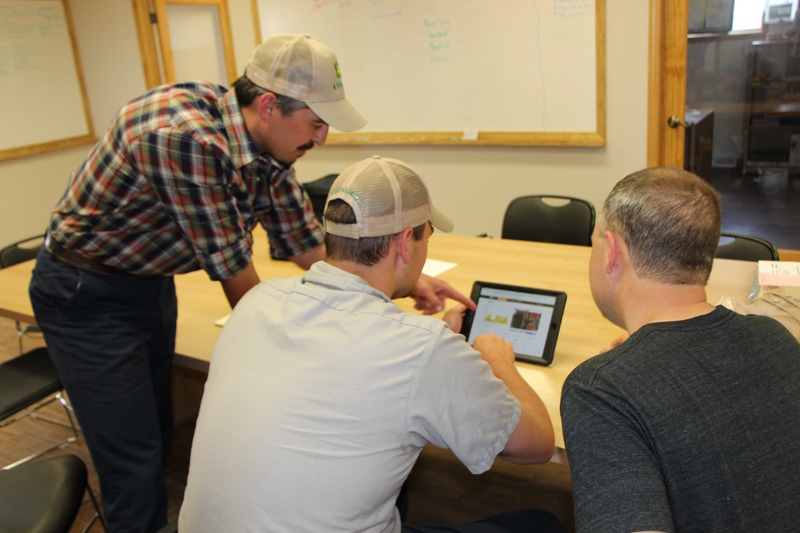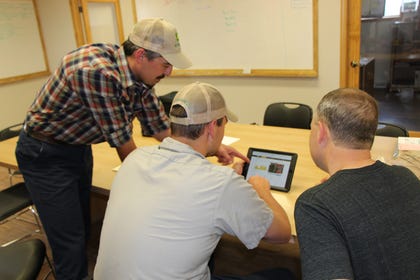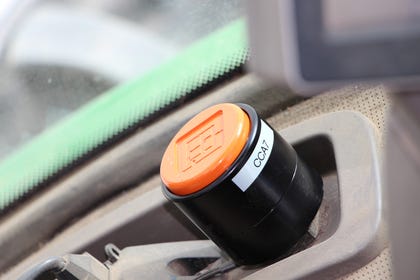August 18, 2014

Matthew and Joe Schweigert, Cuba City, Wis., needed a faster way to track their farm machinery fleet. They are fourth-generation farmers who farm 9,000 acres, most of which are devoted to seed corn, field corn and soybeans.
At any given time, they might have up to nine vehicles deployed across several counties.
“If a machine breaks down, or is idling too long, we need to know that right away so we can modify our schedule accordingly,” says Matthew Schweigert. “Timing is especially important for operations like ours,”

Brothers Matt and Joe Schweigert, Schweigert Farms, review vehicle data with Patrick Dumstorff, team member with 640 Labs. The data was collected with new 640Drive.
The Schweigert’s tried a variety of methods over the years to collect vehicle information. Clipboards, jump drives, spreadsheets, even proprietary clouds marketed by machinery suppliers. But all of these methods had a lag time, sometimes up to two to three days.
“We would have the data, but we were never able to view it fast enough to make decisions on the fly,” Matthew says. “Even a day can be too long if you need to correct a problem.”
So this year they tried something new. They traded in their jump drives for a new device made by 640 Labs, a data analytics company formed by two electrical engineers who wanted to bring their cellular experience at Motorola back home to the Midwest farms.
“There’s a cavernous gap between what’s being done and what can be done on farms,” says Patrick Dumstorff, team member with 640 Labs. “We thought agriculture could use an injection of technology.”
Smart plug
The Schweigerts learned about the company last February at the National Farm Machinery Show. Dumstorff and 640 Labs’ co-founders Craig Rupp and Corbett Kull, were all lined up wearing black t-shirts and displaying the new 640Drive along with case studies that showed how the data could be used.
The device is a small black cylinder, about the size of a miniature flashlight, which plugs into the diagnostics port on farm vehicles. It taps into the vehicle’s controller area network, or “CAN” bus.
 “Tractors, combines and sprayers all have a canbus onboard,” says 640 Labs co-founder Craig Rupp. “All sorts of information flows over the can bus, more than what you’d ever see on a conventional display.”
“Tractors, combines and sprayers all have a canbus onboard,” says 640 Labs co-founder Craig Rupp. “All sorts of information flows over the can bus, more than what you’d ever see on a conventional display.”
The 640Drive decodes all of the information about a vehicle, such as engine temp, RPMs, fuel use, vehicle speed, torque, and even what gear you’re in. It has information about the implements, too, in addition to GPS location.
The 640Drive records the information and sends it to the driver’s iOS or Android device via Bluetooth in a dashboard format. The same data is sent to the cloud, via your Mobile device’s cellular network or WiFi connection, where it is stored and analyzed. Users can access their data remotely by signing in to their 640 Labs account from any mobile device or modern web browser and entering their username and password.
“In ultra-nerdy language, we are pushing the data out to farmers and applying advanced analytics on the back end,” Dumstorff says.
The data is stored on Amazon’s cloud, the same cloud used by Netflix, for example, to stream movies or what hospitals use to store hipaa data, Dumstorff says. “My mother gets really excited when I say that.”
Data analytics
To analyze the data, 640 Labs uses the same type of software used in high-volume manufacturing to test for defects. The software processes millions of data points and looks for outliers, shown as spikes, in the data that might indicate a problem on the factory floor.
The same software algorithms are used in the medical field to detect, for example, anomalies in a person’s heartbeat.
Dumstorff says 640 Labs’ equipment will work with any brand of machinery. He says the data they collect is more detailed or “granular” than what you’d see on a conventional display monitor because more data points are being measured. Plus, the data is unbiased because it is not tied to particular brand of seed, chemicals or machinery.
“We don’t judge the data,” he says. “We just present the facts and look for patterns that might explain any variation.”
To illustrate, he holds up a chemical application map of an 80-acre field in Iowa. “As you can see, there are little red lines that show up exactly every 60 ft., Dumstorff says. “Such equal patterns are not found in Mother Nature, which would suggest a mechanical problem with the sprayer. Turns out one of the boom sections wasn’t working. All it would have taken was a wrench to solve the problem.”
Test run
It was 9:00 a.m. on a Thursday and Matt, Joe and crew had just finished planting corn. It was their first season using the 640 Labs platform, and they felt comfortable with how it worked. Now, Joe was willing to demonstrate what it could do.
He climbs up the ladder to his John Deere tractor cab and holds up the 640Drive and iPad. “This is all I need to start logging data,” he says.
He starts the tractor and plugs the drive into the tractor’s 9-pin diagnostic port. “Now, we bring up the 640 Labs app, go into “settings,” then “connect to drive,” and I click on the appropriate device i.d. And that’s it.” He places the iPad in a cradle in front him, which now serves as his monitor.
Later, Joe goes to his office and uses his desktop computer to show how he can access the same data remotely. This time he uses the 640 Labs website to log on. The data appears in the same dashboard format, so he can see the total number of acres planted that day, the number of fields, vehicles deployed, hours run and fuel use. “If you zoom in, you can view the data by field to see “time in the field,” “acres,” “acres/hr.”, “fuel use,” average torque, RPMs, vehicle speed and the path map.
Joe and Matt say they also will use the data to analyze fuel use and RPMs to determine if they need to trade or upsize their equipment.
Later this year they plan to install 640Drives on their sprayers and combines to track additional variables such as application rates, path maps, yields, and moisture levels.
“640 Labs gives me the ability to view every operation as it is happening,” Matt says. “It’s almost like riding in all the tractors at once.”
“Our goal was zero-data entry and a one-day turnaround,” he adds. “Now we’re down to less than a minute.”

The 640Drive collects field and vehicle information on the go and sends it to your Bluetooth- enabled de-vice in the cab, where you can view what is happening in real time. Cellular technology sends the data to the cloud, where users can access the same information remotely through the 640 Labs app or website by entered their username and password.
Big Data analytics
Dumstorff says 640 Labs performs the same work that its founders did when they worked at Motorola. “To be honest, our company has been doing the same thing for years with radio receivers and cell phones. We’re testing for the signal in the noise. Now we’re just applying it to the farm.”
He says that mobile embedded software and hardware, application development, cloud computing, high volume manufacturing and big data analytics will change the face of farming in years to come. “We ‘don’t know what we don’t know,’ as we all like to say, Dumstorff adds. “But we know we are going to be disruptive. Every time we’ve looked, there’s something going on in every field.”
For more information, visit http://www.640labs.com.
About the Author(s)
You May Also Like




